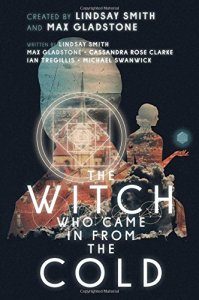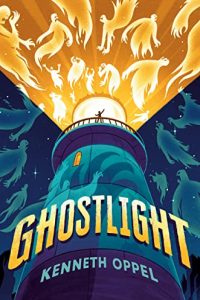Paul Di Filippo reviews James Gunn
Transgalactic, by James Gunn (Tor 978-0765380920, $26.99, 224pp, hardcover March 2016
 When I reviewed the predecessor to this book, Transcendental, in this very venue, I said: “It is wise, exciting, clever, surprising, hip and au courant (or perhaps timeless is a better word). Its technical craftsmanship is subtle and awe-inspiring.” It is now over two years later, and the sprightly ninety-year-old Jack-the-lad who composed it, James Gunn, is therefore ninety-two years old. He bids fair to equal or surpass his pal Jack Williamson, who remained productive up to age ninety-eight. Let’s see if Transgalactic (which happens to share its title, and perhaps a little of its flavor, with a recent van Vogt omnibus) lives up to the book that launched the series.
When I reviewed the predecessor to this book, Transcendental, in this very venue, I said: “It is wise, exciting, clever, surprising, hip and au courant (or perhaps timeless is a better word). Its technical craftsmanship is subtle and awe-inspiring.” It is now over two years later, and the sprightly ninety-year-old Jack-the-lad who composed it, James Gunn, is therefore ninety-two years old. He bids fair to equal or surpass his pal Jack Williamson, who remained productive up to age ninety-eight. Let’s see if Transgalactic (which happens to share its title, and perhaps a little of its flavor, with a recent van Vogt omnibus) lives up to the book that launched the series.
You might recall that in the exciting first novel, our protagonists, Riley and Asha, experienced an exotic Chaucerian odyssey across the galaxy in their quest to discover the Transcendental Machine, the essential artifact left behind millions of years ago by the Forerunner civilization that preceded the current Galactic Federation of myriad sapient species. Having achieved their grail, and passing through the stargate function of the Machine, Riley and Asha were sent inadvertently to separate destinations, and incidentally upgraded into more-than-human status, as the Machine disintegrated them and rebuilt them with subtle tailoring at the exit portals.
So we discover Riley waking up after transmission inside a giant ancient monument on a primitive planet where the intelligent beings are mini-dinosaurs. And Asha steps forth from a fountain housing her ancient stargate onto a world full of Eloi-like humanoids. In alternating chapters, each adventurer masters the culture of the host worlds, finds transportation into space, and returns to the main sphere of activity of the Federation, hoping to reconnect somehow with their mates. In the process, they each adopt a native companion. Asha has Solomon, and Riley has Rory. Gunn deviates momentarily from his seesawing narrative viewpoints of Riley and Asha to give us an intriguing chapter apiece in which we see things through the eyes of Solomon and Rory.
This early part of the book evokes a kind of Philip Jose Farmer World of Tiers High Adventure ambiance, as well as recalling, to me anyhow, one special sense-of-wonder book that struck me very forcefully in my youth: Andre Norton’s Galactic Derelict, whose Forerunner theme aligns with Gunn’s.
Asha makes her way to the hub of the Federation, the secret solar system where the government is centralized. Riley, not knowing those coordinates, ends up on the pleasure planet of Dante. Their separate adventures—which include ferreting out clues about the rot at the core of the Federation—continue until both end up on the ancestral world of Earth, where ultimate revelations reach a tipping point. This last portion remind me a bit of a similar milieu in Earthblood, by Laumer and Brown.
But I mentioned van Vogt earlier, and surely the ultimate homage for Gunn is The World of Null-A, featuring the battle of superman Gilbert Gosseyn against the autocratic Machine. In this case, the bad “machine” is not the good Transcendental gadget but the artifically intelligent “Pedia” that secretly holds the reins to the Federation.
Unlike the somewhat infallible and egocentric Gosseyn, however, Asha and Riley realize the limitations of their new selves. “Transcendence was not the panacea she and Riley had imagined. It was not enough to think clearly and behave rationally. These were the basic requirements for a decent society, but they were not enough…for a saner, more rational existence.” And that brave new world, after all, is the ultimate goal of the pair. “[To] save the galaxy from itself, to fulfill the promise born into the first living creatures, not only to survive but to prevail. To improve. To be the best they could be. To do that the galaxy needed a more nourishing system of governance, of art, of literature, of discourse.”
To say that this attitude is antithetical to the current crop of miserabilist, defeatist, cynical, dystopian SF is to state the nakedly obvious. Gunn is bucking the current publishing tide, yet there is nothing forced or labored or disingenuous about this book. He sells the hope. It reads as a sincere credo from someone who has seen a lot, lived a lot, meditated a lot, and wants to share that wisdom in an artistic manner.
The novel ends on a highly satisfying note, but leaves the horizon open for further narratives, on which we can hope Gunn is already working.
One final thing to note about this book. Its Clutian Real Year—the subtextual era of relevance which its surface future is really depicting—is this very moment, the 2016 craziness reflected in our politics and jagged culture. How can we tell? What moment does this sound like to you?
“The Federation had devolved into a tangled web of bureaucratic bungles, dead ends, and corruption… [The] bureaucracy had been taken over by autocrats and oligarchs and other hidden and less obvious forces to subvert and control the direction of the Federation itself, for purposes that were not yet clear. Other than the enjoyment of the ultimate human pleasure, power itself.”
This could have come from the stump speech of almost any of the current Presidential candidates. And Gunn wrote it as long as two years ago, possibly.
That’s an SF master doing his job!






This absolutely reminds me of Jack Williamson’s later work, as you alluded to, where even into his nineties his novels had a youthful vigor that writers decades younger couldn’t equal.
I’ll be checking both these book out, as I’m utterly tired of dark visions and dystopias.